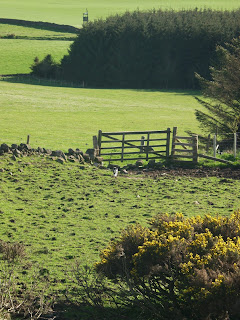A rant concerning bees and poison
This is the text of an email I have just sent to Richard Lochhead MSP (Richard.Lochhead.msp@scottish.parliament.uk), the current Minister for Rural Affairs. I very strongly urge you to write to him, too. I strongly urge you not to copy my text, not least because my text is extremely intemperate, but also because the more different messages he gets from different people the more persuasive it will be.
Standingstone Farm, Auchencairn, DG7 1RF
Dear Richard Lochhead
Harem: Notes and clarifications
Harem is fiction, but it's fiction based in the real world. However, it's a real world slightly modified.
In part seven, Fiona says to the American journalist that 'there is no road' from Seyðisfjorður to Loðmundarfjorður. In the book, she's deliberately lying; in the real world, she's right. There is no road, and, furthermore, if there were a road, although she's right that it's only eight miles, it would be a tough ride on a bike with a wean on the back — there's a high (and steep) ridge to cross. I do not know whether there are really hot springs in Loðmundarfjorður, but it isn't very likely — it's quite a long way from current volcanic activity. The Kárahnjúkar dam, and the aluminium smelter at Reyðarfjörður it was built to serve, are real, and the controversy over their building was real and painful in Iceland. Indeed, all the places I describe in Iceland, with the exception of the house at Loðmundarfjorður and the road to it, are real.
Blackwater tarn, and the house on it, do not exist. If they did exist, they would be somewhere near the hamlet of Holm, above Holmfirth in West Yorkshire. The unnamed village in which Jane Wilkinson lives (end of Part Two) is entirely imaginary.
Harem: Genesis
On the 25th November 2005, the footballer George Best died. Of course I was vaguely aware of who he was; he'd been, in the real sense of the word, a celebrity for most of my life. But I knew only the grossest outline of his career. After his death, I read a long obituary — possibly in the Observer — and was interested enough to later watch a television documentary about his life. It struck me as extraordinarily sad that a young man of such talent had been so overwhelmed by sudden wealth and the sudden sexual availability of women that it had essentially destroyed his life. It started a train of thought running, about how a young man, far from home, would cope well with those pressures.
That's one of the roots of my novel Harem, and it's the root which actually started me writing. But it's not the only root, and arguably not the main one.
I was brought up a Quaker and a pacifist. The problem of conflict in society was something that interested me as a young man: what its functions and evolutionary drivers were, and how, in a civilised society, we manage and control it. I was interested by a paper by Johan Galtung of the University of Lund on 'Entropy and the General Theory of Peace'. In this paper, Galtung argued that messier and more complex interrelationships between groups and nations led to more frequent, lower level, more easily resolved conflicts, and that by contrast simpler, more clear cut, more structured interrelationships — such as the then current stand-off between the NATO and Warsaw Pact powers — would lead to fewer but much more intense, destructive and hard to resolve conflicts.
Average size of holdings
I posted yesterday about the exponential land tax, and that's raised some questions about how it would affect ordinary farms. So as background data, here is some information about the average size of holdings.
| Territory | Average holding size (Ha) | Source | Notes |
|---|---|---|---|
| USA | 181 | US Department of Agriculture | Quoted as 449 acres |
| Czech Republic | 152.4 | European Commission | |
| Scotland | 101 | Scottish Government | 2010 data |
| UK | 70.8 | European Commission | 2007 data |
| Denmark | 62.9 | European Commission | |
| Germany | 55.8 | European Commission | |
| Sweden | 43.1 | European Commission | |
| Netherlands | 25.9 | European Commission | |
| Norway | 21.6 | European Commission | |
| Italy | 7.9 | European Commission | |
This broadly confirms my belief that the average size of holdings in Scotland is unusually large. My broader argument, of course, is that it is pathologically large, but this post is about data, not argument, so I won't expand on that here. The only country in the EU which currently has an average holding size larger than Scotland's is the Czech Republic, at 152.4 hectares (2010 figures, source European Commission). It's worth noting, however, that across the EU as a whole, the trend in holding size is upwards, and this is particularly true in eastern Europe; the average Czech holding size has doubled in the decade 2000-2010.
On the benefits of Exponential Land Tax

I wrote:
"A variation on the flat land tax which I personally would prefer, but for which I do not believe it would be at present possible to build a democratic majority, would be the exponential land tax. Under this tax, a land owner would pay one penny on the first hectare of his holding, two pence on the second hectare, four pence on the third, eight on the fourth, and so on. This eminently reasonable scheme would see tax of about ten million pounds on the thirtieth hectare. As before, land on which tax was not paid would revert to common. Such a tax would drive rentier landowners and private sporting estates out of Scotland within a decade. ** Obviously the starting point and scaling factor could be adjusted, but the principle that larger holdings should be taxed more seems to me socially beneficial."
